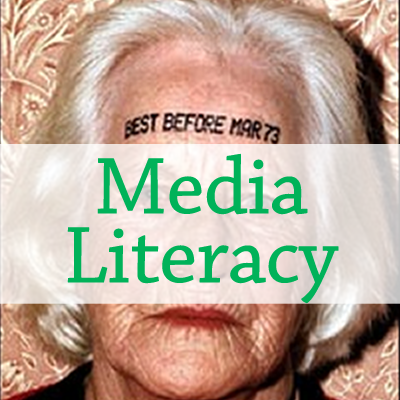 As I travel around the US teaching internet safety to students, parents, and school districts one of the central topics of discussion is this idea of “media literacy”. What is media literacy?
As I travel around the US teaching internet safety to students, parents, and school districts one of the central topics of discussion is this idea of “media literacy”. What is media literacy?
As consumers of media we need to understand when we are being subjected to some sort of media bias 100% of the time. Producers of content are trying to make you FEEL something and believe something which might go against your values.
Do you even realize when it’s happening? The overwhelming percentage of media messages have some sort of bias (even most news outlets). When you hear or see a message can you identify the: sexist, ageist, racist, religious biases, or political agendas?
And please don’t assume that your favorite news agency only leans in one direction. That direction will blow in the wind according to the slate of advertisers on deck. Every opinion is for sale, and the farther you dig into media literacy the clearer that will become.
Being media literate helps you to analyze and evaluate the message you see, hear, and “consume” via all delivery systems: print, radio, television, and digital. Teaching media literacy to young people becomes particularly important because of the massive amount of content teens consume on a daily basis.
The average American teenager spends:
- 31 hours per week watching television
- 17 hours per week listening to music
- 3 hours per week watching movies
- 4 hours per week reading magazines
- 10 hours per week online
GRAND TOTAL: 10 hours and 45 minutes per DAY on mass media consumption (according to a study done by the Henry J. Kaiser Family Foundation).
In addition, an overwhelmingly high percentage of the media bias your child is consuming is sexual in nature.The messages your children receive (depending on what they are watching/hearing/reading) generally takes on slight variations of the same flavor:
young men are shallow and heartless sex seekers
young women should only just care about looking photoshop perfect in order to hook and keep the heartless sex seeker
That’s it – this is the basic lens through which your children consume media. Awesome.
Media Literacy Trick: Consume Great Content
If you want to cultivate media literacy in your home and with your children, you need to lay a foundation of solid and worthwhile content to act as a counterpoint to all of the vomit content which exists in the real world and in the digital ether. Incidentally, most of the real-world “print” vomit content is located at the end of the grocery store check out aisle.
If you our your child are at ALL engaged to the current relative size of a Kardashian’s back side….begin reading this list STAT. You need an intervention.
Amazon.com has put together a list of the 100 Books Every Person should read. Think of this as a literary bucket list.
- Go through the list
- Mom and Dad: Read the ones YOU haven’t read yet
- If appropriate to your child’s reading level/maturity – have your child read it as well
- Discuss the book over dinner – like your own little book club
- Your child’s insights will impress you, they were just waiting to be asked. What took you so long?
Remember as you consume content, don’t shy away from the content which might clash with the values you are trying to teach your own children. For example: A book with violent undertones (ie Hunger Games) can act as a springboard for discussion which will linger in your child’s mind far after the discussion is over.
What to do now?
Go to Amazon.com and check out the list. Begin reading WITH your child, and pay attention to the content your child is consuming.
Like today.
